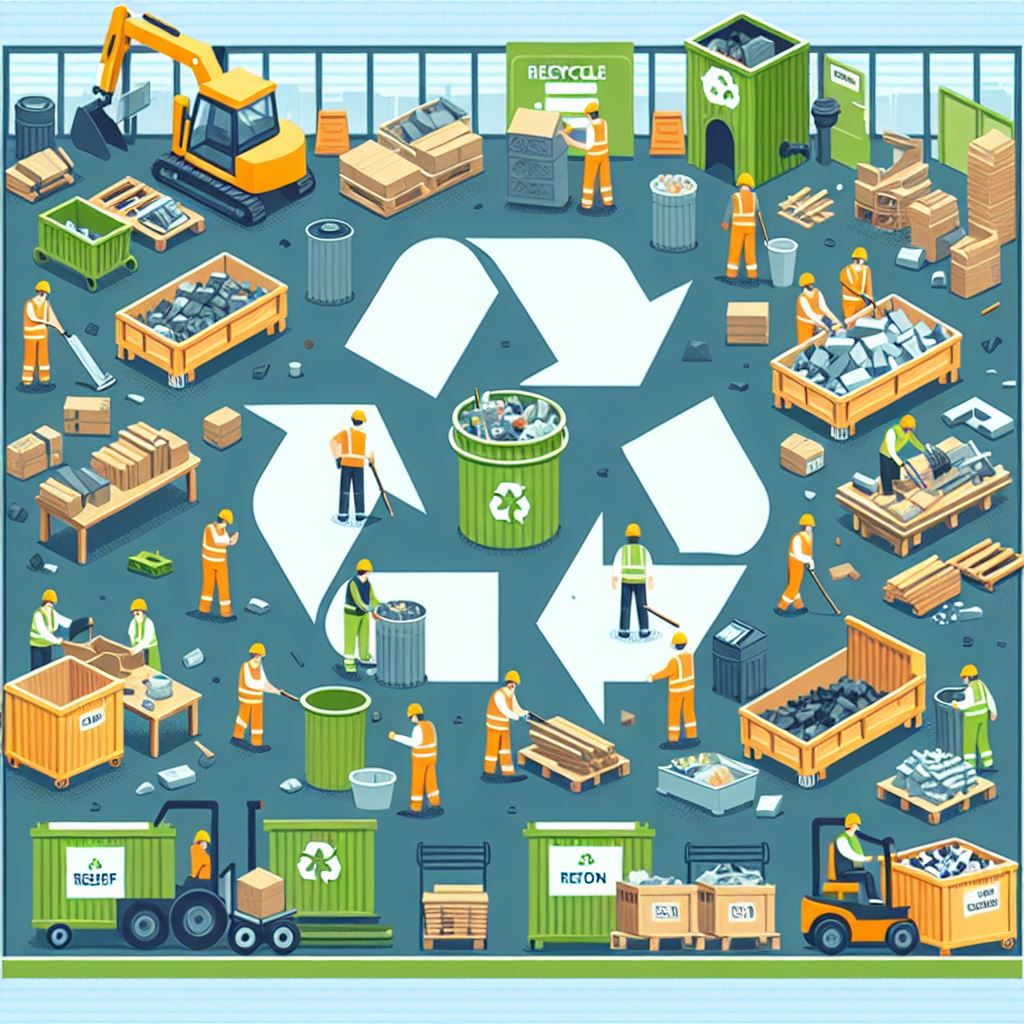The inspiration behind a different kind of future for construction waste recycling
One person's trash is another person's treasure – is an age-old adage that has taken on a new, sustainable form with the launch of an innovative recycling initiative for the construction industry on Vancouver Island, British Columbia, Canada. It is called the Building Material Exchange (BMEx) programme, a forward-thinking solution that allows construction companies to sell or swap leftover materials from job sites instead of sending them to landfills – a move so revolutionary, it could transform the construction industry if it was adopted worldwide, writes John Ridgeway.
Launched by Light House, a Vancouver-based non-profit company, dedicated to enhancing sustainability in the construction sector, BMEx represents a major shift in how the industry manages its waste. It ensures that the benefits of construction waste recycling extend beyond the immediate environmental impact, offering cost savings and community benefits - and could be the model that revolutionises construction and waste management practices across the globe.
Construction waste is one of the largest contributors to landfills worldwide. In Canada alone, the construction industry generates approximately 3.4 million tonnes of waste annually, much of which ends up in landfills. The construction industry generates an estimated 1.3 billion tonnes of construction waste annually worldwide, according to data from multiple sources. This number is anticipated to increase significantly in the coming years. For example, the World Bank projects that by 2025, global construction waste could reach 2.2 billion tonnes annually, driven by rapid urbanisation, population growth and increased infrastructure development, particularly in developing countries.
This waste includes materials like concrete, wood, metals, drywall and carpet, among others. The environmental impact of this waste is staggering, as it contributes to resource depletion, increased carbon emissions and strain on landfill capacities. Many landfills are already at or nearing capacity, making it imperative to find alternative solutions for managing construction debris.
While British Columbia has been a leader in recycling, with innovative programmes like BMEx, the focus is now shifting to actively reduce waste and reuse materials in a circular economy framework. By promoting waste reduction, programmes like BMEx aim to keep valuable materials in circulation for as long as possible, creating economic value while minimising environmental harm.
What is the Building Material Exchange (BMEx)?
BMEx is a matchmaking programme for construction companies that connects them with others who need surplus materials or are looking to offload excess materials from their job sites. Developed by Light House and led by innovator Gil Yaron, it aims to reduce construction waste while also saving companies time and money. BMEx identifies materials such as concrete, wood, carpet and other leftover building supplies and then pairs companies with others in need of those materials.
In essence, BMEx operates as an online marketplace for construction waste, providing a platform where companies can buy, sell, trade, or donate materials. The goal is to promote sustainability by reducing unnecessary resource extraction, minimising landfill waste and reducing construction costs for companies that can repurpose materials rather than buy new. This concept, in its simplicity, carries immense value. It transforms how we view waste - reframing it from something to be discarded to something with real, tangible value.
The environmental impact of sending construction materials to landfills cannot be overstated. Construction sites generate vast quantities of waste, much of which can be recycled or reused. By recycling materials such as concrete and wood, companies can significantly reduce their carbon footprint while also cutting down on waste management costs. Reusing materials also reduces the need for new resource extraction, which often results in deforestation, mining, and other environmentally destructive activities.

Recycling and reusing materials can also save construction companies money, particularly in an industry where margins can be tight. By swapping or purchasing used materials at a lower cost, companies can lower their overheads. Moreover, with global supply chains often disrupted by geopolitical issues, resource scarcity, or natural disasters, having access to locally sourced, recycled materials can also improve the resilience of the construction industry.
In essence, BMEx is part of a broader shift towards using digital platforms and technology to facilitate waste reduction in the construction industry. Through an online marketplace, BMEx enables companies to efficiently match supply with demand, creating a streamlined process for recycling materials.
The platform’s potential for scalability is significant. By growing this kind of technology, BMEx has created a replicable model that can be adopted in other regions across Canada and globally. The programme is user-friendly, allowing companies to list their available materials or post what they are searching for, all while minimising administrative effort.
This digital transformation is further amplified by the rise of big data, artificial intelligence and the Internet of Things (IoT), which have the potential to enhance construction waste management by improving tracking and logistics, optimising material usage and identifying areas for cost savings.
Waste recycling globally
While the concept of construction waste recycling holds tremendous potential, there are obviously many challenges to scaling such programmes globally. Different countries and regions have varying regulations regarding construction materials, waste management and recycling. Harmonising these regulations is key to scaling a solution like BMEx globally.
While the environmental and economic benefits of recycling construction waste are clear, many companies still rely on traditional methods of waste disposal. Raising awareness and encouraging adoption of recycling programmes requires a concerted effort, including incentives for early adopters.
The success of construction waste recycling also depends on the availability of infrastructure for material collection, sorting and redistribution. In many regions, particularly in developing countries, such infrastructure may be lacking, requiring significant investment. Furthermore, changing how the construction industry views waste will take time. For many companies, it may be easier and cheaper to dispose of materials than to invest in recycling them. Shifting this mindset requires education and the demonstration of long-term value.
If a system like BMEx were to be adopted on a global scale, the potential for environmental, economic and social benefits would be profound. Such a system would dramatically reduce landfill usage, helping to mitigate the strain on already overburdened waste disposal sites.
As urbanisation accelerates worldwide, the demand for construction materials will only increase. Without effective waste management strategies, the environmental toll of the construction industry will continue to grow. Recycling programmes like BMEx offer a sustainable pathway for meeting this demand while minimising the industry's environmental footprint.
This is why the Building Material Exchange (BMEx) programme in British Columbia is an inspiring example of how the construction industry can evolve to meet the demands of the 21st century. By reducing waste, recycling materials, and fostering collaboration, BMEx offers a blueprint for sustainable construction that can be replicated globally.
As the world moves towards a more circular economy, initiatives like BMEx will play a crucial role in shaping the future of construction. With the right regulatory frameworks, infrastructure investment and a cultural shift within the industry, the vision of zero-waste construction could become a reality. Imagine a world where one person’s trash truly is another person’s treasure - not just on Vancouver Island, but across the globe.
Additional Blogs

Are apprenticeships a real investment in skills or just cheap labour?
Spend any time in the construction sector and you’ll hear the same two conversations running in parallel. The first is about the skills shortage with ageing trades, retirements outpacing recruitment,...
Read moreShould governments subsidise modular construction to solve the housing crisis?
There’s something deeply uncomfortable about the way we talk about the housing crisis in Britain. We describe it as “chronic”, “systemic”, “complex”. We commission reviews. We announce targets. We...
Read more

Do BREEAM and LEED really make buildings better?
Walk into the reception of any new office block and you’ll usually see it, framed proudly behind the desk - a certificate, stating BREEAM Excellent or LEED Gold - sometimes Platinum, if the developer...
Read more